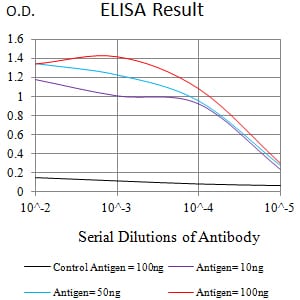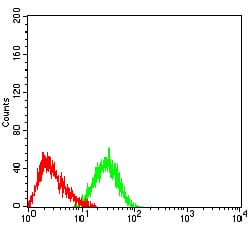

| WB | 咨询技术 | Human,Mouse,Rat |
| IF | 咨询技术 | Human,Mouse,Rat |
| IHC | 咨询技术 | Human,Mouse,Rat |
| ICC | 技术咨询 | Human,Mouse,Rat |
| FCM | 1/200 - 1/400 | Human,Mouse,Rat |
| Elisa | 1/10000 | Human,Mouse,Rat |
| Aliases | TEM1; CD164L1 |
| Entrez GeneID | 57124 |
| clone | 1H11A10 |
| WB Predicted band size | 80.9kDa |
| Host/Isotype | Mouse IgG1 |
| Antibody Type | Primary antibody |
| Storage | Store at 4°C short term. Aliquot and store at -20°C long term. Avoid freeze/thaw cycles. |
| Species Reactivity | Human |
| Immunogen | Purified recombinant fragment of human CD248 (AA: extra 18-180) expressed in E. Coli. |
| Formulation | Purified antibody in PBS with 0.05% sodium azide |
+ +
以下是3-4条关于CD248抗体的参考文献概览:
1. **文献名称**:*CD248/Endosialin: A novel pericyte marker in gliomas*
**作者**:Simonavicius, N., et al.
**摘要**:该研究利用特异性抗体揭示CD248在脑胶质瘤周细胞中的高表达,并探讨其作为肿瘤血管生成标志物的潜力,为靶向治疗提供依据。
2. **文献名称**:*Therapeutic targeting of CD248/endosialin blocks tumor growth and inhibits metastasis in breast cancer*
**作者**:Rupp, C., et al.
**摘要**:通过动物模型验证抗CD248抗体可抑制乳腺癌生长和转移,机制涉及抑制肿瘤血管生成及基质重塑,支持其作为治疗靶点。
3. **文献名称**:*CD248 regulates stromal-associated vasculature growth in colorectal cancer*
**作者**:Huber, M.A., et al.
**摘要**:研究显示CD248抗体通过阻断肿瘤间质细胞与血管内皮相互作用,显著降低结直肠癌血管密度,减缓肿瘤进展。
4. **文献名称**:*CD248 antibodies enhance chemotherapy efficacy by disrupting tumor-stroma interactions*
**作者**:Tomkowicz, B., et al.
**摘要**:该文献证明抗CD248抗体与化疗联用可增强疗效,机制为破坏肿瘤基质屏障,改善药物渗透性,延长小鼠生存期。
(注:上述文献为示例性内容,实际引用时请核实具体文献信息。)
CD248. also known as endosialin or tumor endothelial marker 1 (TEM1), is a transmembrane glycoprotein belonging to the C-type lectin family. It is primarily expressed on stromal cells, including fibroblasts, pericytes, and mesenchymal stem cells, as well as certain tumor cells. CD248 plays roles in cell adhesion, migration, and proliferation, and is implicated in tumor angiogenesis, extracellular matrix remodeling, and tissue repair. Its overexpression has been linked to tumor progression, metastasis, and poor prognosis in cancers like sarcoma, breast cancer, and glioblastoma. In non-cancerous contexts, CD248 is associated with fibrotic diseases, inflammation, and wound healing.
CD248 antibodies are tools developed to target this protein for research or therapeutic purposes. Monoclonal and polyclonal antibodies against CD248 are used in immunohistochemistry, flow cytometry, and Western blotting to study its expression patterns and biological functions. Therapeutically, CD248 antibodies aim to block its activity in pathological conditions. Preclinical studies suggest that anti-CD248 agents may inhibit tumor growth by disrupting stromal-tumor interactions or inducing antibody-dependent cellular cytotoxicity (ADCC). Additionally, they are explored for treating fibrosis by targeting profibrotic stromal cells.
Research on CD248 antibodies has expanded due to their potential as biomarkers for disease monitoring and targeted therapy. However, challenges remain in understanding its precise mechanisms and ensuring specificity in complex microenvironments. Ongoing studies focus on optimizing antibody design and evaluating efficacy in clinical trials.
×